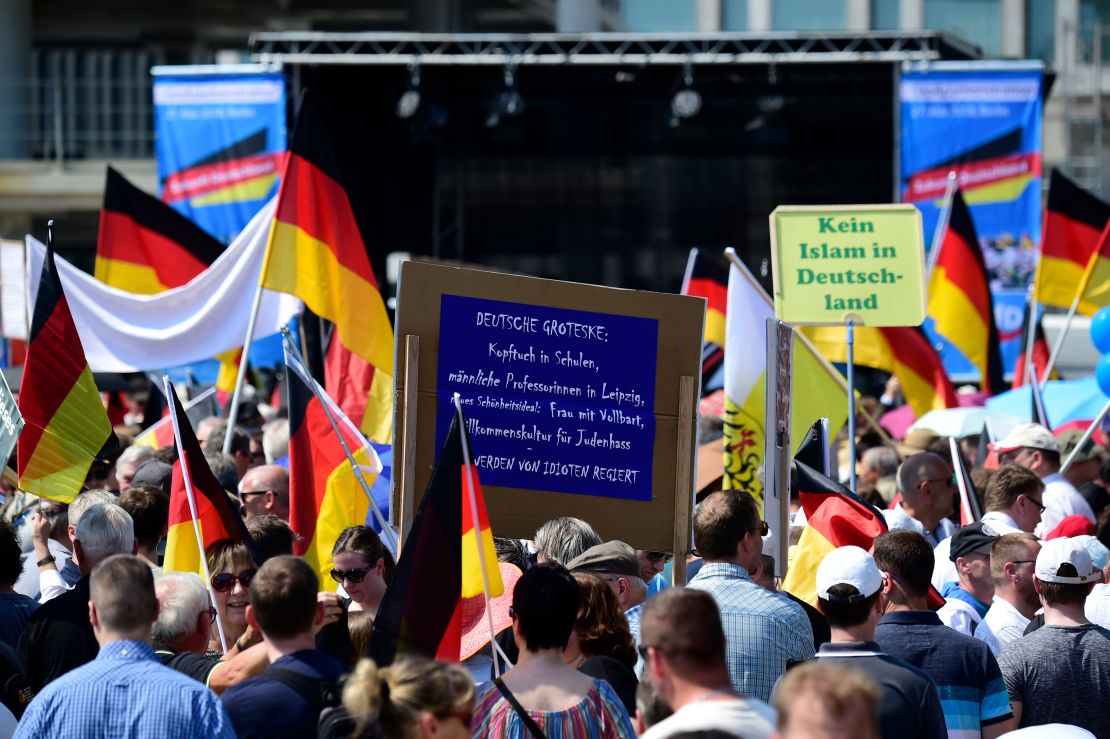Every public building in the southern German state of Bavaria is now required to display a Christian cross at the entrance to greet visitors.
The law, which came into effect Friday, has re-ignited a fierce national debate about the role of religion in politics and what it means to be German.
“The cross is a fundamental symbol of our Bavarian identity and way of life. It stands for elementary values such as charity, human dignity and tolerance,” declared Bavarian State Premier Markus Soder at a cabinet meeting in April when the new requirement was announced. He then walked out and nailed a cross to the wall of the lobby in the Bavarian State Chancellery.
Parts of Germany have been grappling with a crisis of identity after the country accepted more than a million refugees in 2015, many of whom are Muslims.
Many arrived across the border from Austria, entering Germany via Bavaria, one of Germany’s most politically and socially conservative states. It also has one of the highest proportions of Christians – in the 2011 census, over 75% of Bavarians identified as Roman Catholic or Protestant, compared to 62% nationwide.
Bavaria’s ruling party, the Christian Social Union (CSU), has been steadily losing voters to the far-right, anti-Muslim Alternative for Germany (AfD) party.
The “Kreuzpflicht” or “crucifix obligation,” ushered in before new elections in October, may be one attempt to win voters back.
‘Law could create unrest’
The AfD, which became the first far-right party in decades to enter German parliament following elections last year, criticized the new law as a superficial piece of politics. “The Christian cross is being turned into an election accessory, while the conservatives refuse to protect our basic values with real actions,” said the AfD’s co-chair, Alice Weidel, in a statement in April.

Bavaria’s Christian leaders have also expressed concern. Cardinal Reinhard Marx, Archbishop of Munich and Freising, said displaying the cross should not be mandatory and that he feared the law would create “division, unrest and adversity.”
“It is a symbol that opposes violence, injustice, sin and death. It is not a symbol against other people,” said Marx in an April interview with German newspaper Suddeutsche Zeitung.
Archbishop Ludwig Schick of Bamberg in northern Bavaria welcomed the prospect of more Christian crosses appearing in the state.
“Christians are happy when they see a cross,” he wrote on Twitter on May 2, adding that the symbol held a powerful meaning for followers of Christ: “In the cross is healing, in the cross is life, in the cross is hope.”
But, like Marx, he has also stressed the importance of the cross as a symbol of inclusivity, not hostility. It is “a sign of unity, reconciliation, peace, brotherhood, solidarity,” he told radio station Bayerischer Rundfunk in April.
‘Islam does not belong to Germany’
Germany’s Chancellor Angela Merkel has faced a public backlash for her handling of the refugee crisis. In response, she appointed Bavarian CSU leader Horst Seehofer to be the Ministry of Interior and “Heimat” – a controversial word that translates as “home” or “homeland” but also signals nostalgia for German tradition. The word is widely used by the AfD and was cited frequently in the “blood and soil” propaganda of the Nazi regime.
Seehofer has promised to crack down on asylum applications and speed up deportations. In a March interview, Seehofer told Germany’s largest tabloid, BILD: “Islam does not belong to Germany,” mimicking a central slogan of the AfD and adding: “Germany was shaped by Christianity.”
“The Muslims who live among us naturally do belong to Germany,” he added. “Of course, that does not mean that we should, out of a false consideration of others, give up our traditions and customs. Muslims need to live with us, not next to us or against us.”
Atika Shubert reported from Berlin and Judith Vonberg wrote from London. CNN’s Nadine Schmidt also contributed to this report.





